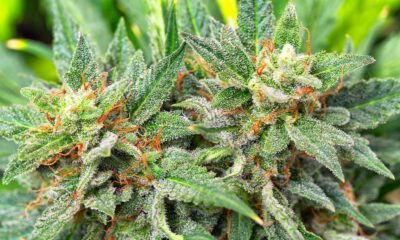
Joint Opinions
Can Beer and Weed Co-exist?
While some believe unleashing a fully-legal recreational marijuana market in the United States would be a noose around the necks of beer brawlers like Budweiser and Coors, some financial experts believe the two industries can peacefully coexist.
According to Trevor Stirling, an investment analyst for Sanford C. Bernstein, beer and weed don’t exist as a nemesis to one another and instead are separate industries with enough unique demand to be profitable in the marketplace. The firm’s latest research finds that even though medical marijuana is now legal in 23 states, as well as for recreational use in Colorado and Washington, none of this legislation has had a significant impact on the brewing industry.
“The average blue-collar Bud drinker is less likely to be smoking pot,” said Stirling. “As far as medical marijuana is concerned, it does not appear to be a big threat to the beer industry.”
Yet, try explaining this concept to the global giants of the beer market, who have lived in fear of legal marijuana for years based on concerns that the cannabis industry will swoop in and pull dollars from their bottom line – a potential, but minuscule concern, says Stirling.
“One threat is the constrained budget: someone has a fixed amount of money to spend and the more they spend on pot, the less they spend on beer,” he said, adding that so far, legal pot markets appear to be doing nothing less than strengthening beer industry.
In fact, per capita beer consumption has increased in the vicinity of 0.5 percent in 10 of the largest states that have legalized medical marijuana. Although there was a brief period when the consumption of beer dropped off in those areas, the market ultimately fluctuated and eventually leveled it out near the national average.
“It is not a statistically proven thing and shows there isn’t a major impact on beer from legalization of medical marijuana and if anything it could be positive,” said Stirling.
However, major brewing companies have taken a bit of hit in recent years, but as Stirling points out, this phenomenon has had nothing to do with states legalizing marijuana. Statistically, beer sales have diminished over the past five years due to insane unemployment rates and a shift on behalf of the average drinker from beer to hard liquor. This is where it becomes difficult to convince major brewers to not be concerned over legal marijuana, because the industry does not want their customer base to spend any percentage of their beer budgets on other socially-acceptable buzzes, like whiskey or weed.
This sentiment, however, seems to be primarily the opinion of the big dogs of the brewing world and not those expressed by the entire beer industry. Colorado has one of the leading independent, craft brewing markets in the United States, as well as Alaska and Oregon, who incidentally will decide on the issue of recreational marijuana in the upcoming November election. The idea of legal weed does not appear to be a bearing in these areas, according to Stirling.
In Colorado, some independent brewers have refused to think of legal marijuana as a threat to their business, and instead, have found ways to incorporate stoner ingenuity and a love for beer through creative marketing. Oskar Blues, for example, recently began printing designs on their packaging to show customers how to transform their empty cans into an old school smoking device. Other beer makers, like West Flanders and Mountain Sun, have stepped out with products celebrating pot legalization with craft brews appropriately named “Recreational Smoke” and “Colorado Kind.” Although these beers do not contain THC, the names alone reveal a positive attitude on the part of independent brewers that beer and weed can coexist together in harmony.
While some brew masters, like Andy Brown from the Denver-based Wynkoop, believe the two industries are still too suspicious to do business together, there is speculation that beer and weed could combine on some level, sometime in the future, and give beer drinkers and cannabis users the best of both worlds – marijuana-infused beer and cocktails.
In Washington state, Mirth Provisions is already marketing cannabis-infused coffee and soda called “Legal” that contains 20mg of THC per bottle. Experts believe this concept could easily be recognized around the world by the $1.5 trillion alcoholic beverage industry, especially if the booze market continues getting nervous about losing market share and begins developing products just to keep up with the Jones’, so to speak.
While marijuana advocates often speak out against alcohol for being more hazardous to public health than marijuana, most agree they do not want to eliminate the booze industry in exchange for a nationwide marijuana market – they simply want cannabis regulated and taxed in the same manner.
“This is not an attack on alcohol. Nobody is calling to repeal alcohol,” said Paul Armentano, Deputy Director of NORML. “We’re simply talking about a principle and public policy that we have in place for alcohol that we argue is good public policy and should therefore be applied to marijuana rather than the current alternative prohibition.”
Interestingly, Stirling concludes that his latest research indicates that not only would legalized marijuana be good for the brewing industry, but it would also be a tremendous boost for restaurant chains.
What do you think? Should the brewing industry feel threatened by cannabis legalization? Tell us in the comments below.

























